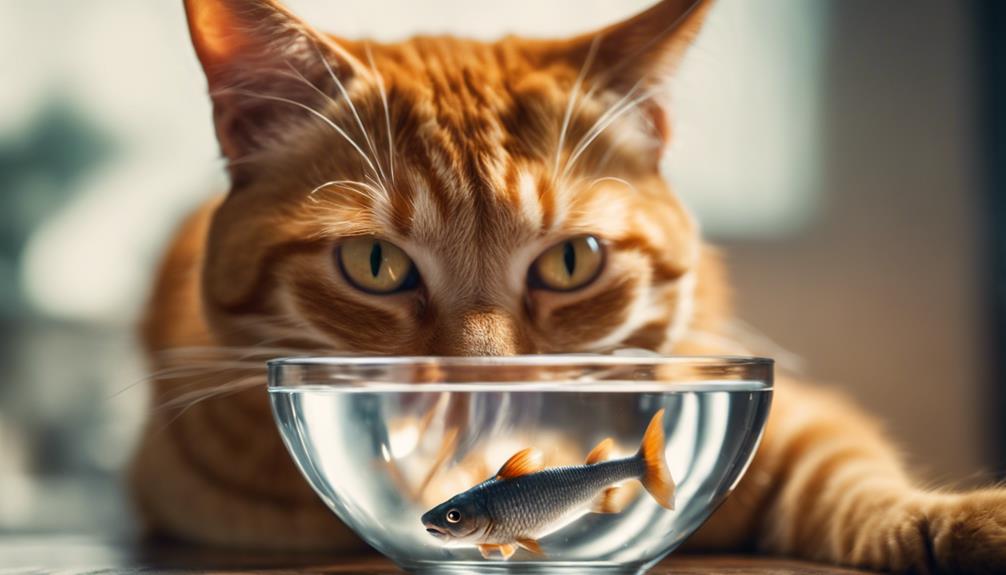Ever wondered why your feline friend has a particular affinity for fish? It all boils down to more than just a tasty treat. Cats' deep-rooted instinct as carnivores plays a significant role in their love for fish. But there's much more to uncover beneath the surface. Stay tuned to unravel the intriguing reasons behind why cats are drawn to this aquatic delight.
Evolutionary History and Cats' Taste Preference
Cats' preference for fish can be traced back to their evolution as obligate carnivores with a heightened sensitivity to umami flavors. Through their evolutionary history, cats have developed a profound taste for meat, including fish, which aligns with their dietary needs. The introduction of fish to cats by Ancient Egyptians around 5,000 years ago likely played a role in shaping their preference for fish as a significant part of their diet.
With umami receptors more attuned to glutamates due to their meat-based diet, cats find the taste of fish particularly appealing. This sensitivity to umami flavors, especially prevalent in fish like tuna, contributes to the strong attraction cats have towards this type of food. Furthermore, cats' predatory instincts drive them to seek out foods rich in essential nutrients, making fish a valuable source of protein and other vital nutrients for their overall health and well-being. Tuna, being an umami-rich fish, perfectly fits into cats' taste preferences, further solidifying their fondness for fish.
Umami Sensitivity in Cats
You know that cats have a heightened sensitivity to umami taste, right? This special ability makes them particularly drawn to foods rich in glutamates, like fish.
Understanding this umami sensitivity sheds light on why cats are so fond of fish flavors.
Cat Taste Preferences
With their heightened sensitivity to umami taste, you, as a cat, are naturally inclined towards savory and pleasant flavors in your food choices. Cats have evolved with a strong preference for fish due to their umami-rich profile, aligning with their carnivorous nature.
The umami receptors in cats are highly responsive to the glutamates present in meat-based foods, making such flavors particularly appealing. This preference for umami taste not only influences a cat's food-seeking behavior but also enhances their overall enjoyment of meals.
Tuna, a favorite among cats, stands out for its robust umami flavors, making it a top choice for many feline friends. The allure of umami plays a significant role in shaping a cat's taste preferences and dietary habits.
Fish Flavor Appeal
Seeking out fish flavors is a natural inclination for cats, driven by their heightened sensitivity to umami taste and the glutamates present in meat-based foods. Cats' umami receptors make them strongly attracted to umami-rich foods, explaining their preference for fish flavors in their diet.
The savory and pleasant umami taste plays a significant role in cats' appetitive behavior towards fish, making tuna, an umami-rich fish, a favorite among felines. Due to their evolutionary history of consuming a meat-based diet, cats find it challenging to resist the umami taste present in fish, which triggers a strong attraction.
This explains why cats have a particular fondness for fish flavors like tuna.
Umami-Rich Food Choices
Cats' heightened sensitivity to umami taste drives their natural inclination towards seeking out umami-rich food choices, particularly those like fish. Their taste receptors are finely tuned to detect glutamates, making the umami flavor in fish, such as tuna, especially appealing to them.
This preference aligns with cats' carnivorous nature and ancestral diet, where protein-rich foods were essential. The strong umami taste in fish plays a significant role in influencing cats' appetitive behavior, leading them to favor these protein-packed options.
Due to their evolutionary history and umami sensitivity, cats are naturally drawn to foods like fish that offer a savory and satisfying taste profile, meeting their biological needs effectively.
Nutritional Benefits of Fish for Cats
Indulging your feline friend with fish can significantly boost their overall health and well-being. Fish is a nutritional powerhouse for cats, containing omega-3 fatty acids that support their immune system and promote brain health. It also provides essential amino acids like Taurine, which are crucial for cats as obligate carnivores. Additionally, fish is a great source of lean protein, aiding in muscle development.
When feeding cats fish, it's important to be mindful of mercury levels, as high levels can be harmful. However, when consumed in moderation, fish can offer a variety of vital vitamins and minerals such as vitamin D and selenium, helping to fulfill their dietary needs.
Including fish in your cat's diet can also benefit their urinary tract health and serve as a flavor enhancer, making mealtime more enjoyable for your feline companion. With its low fat content, fish is an ideal option for weight management in cats while providing a tasty and nutritious meal choice.
Raw Fish Feeding Considerations
Consider the potential risks associated with feeding raw fish to your feline companion before incorporating it into their diet. Cats love fish, but raw fish feeding can pose serious health complications.
Raw fish may lead to thiamine deficiency in cats, causing severe issues. To ensure your cat's well-being, opt for cooking methods like boiling, grilling, or roasting the fish before feeding it to them. These methods are best for your cat's digestion and help eliminate the risks of food poisoning.
Consulting a vet before introducing raw fish into your cat's diet is crucial to prevent any adverse effects. Remember, the risks of thiamine deficiency and food poisoning from raw fish feeding are significant, so take the necessary precautions to keep your feline friend healthy and happy.
Popular Fish Choices Among Cats
Before introducing raw fish into your cat's diet, it's crucial to be aware of the popular fish choices among cats to cater to their taste preferences effectively.
Cats love tuna for its strong smell and flavor preferences. Salmon is also a favorite among felines for similar reasons. Sardines are another top choice due to their high fat content, offering a rich and satisfying taste that cats enjoy.
Additionally, fish such as halibut, tilapia, cod, and flounder are commonly enjoyed by cats, providing variety in their diet. By offering a range of fish types, you can determine your cat's favorite and cater to their individual tastes effectively.
Remember that cats may have different preferences when it comes to fish, so experimenting with various options can help you find the ideal choice for your furry friend.
Allergies and Moderation in Fish Feeding
Maintaining moderation in your cat's fish consumption is essential to prevent potential allergic reactions and maintain a balanced diet. If your feline friend is allergic to fish or develops sensitivities to fish proteins, it can lead to various health issues like skin problems, digestive troubles, or respiratory issues.
Here's how you can ensure your cat's well-being when it comes to fish feeding:
- Monitor your cat's response to fish to detect any allergic reactions or sensitivities early on.
- Avoid excessive consumption of fish to prevent imbalances in your cat's diet.
- Practice moderation by incorporating fish into your cat's diet in controlled amounts.
- Consult with your vet to determine if your cat has any sensitivities to fish and to receive guidance on how to maintain a balanced diet that caters to your cat's specific needs.
Frequently Asked Questions
Why Do Cats Love to Eat Fish?
You love to eat fish because it's packed with protein, omega-3 fatty acids, and that irresistible umami flavor that your meat-based diet craves. Your keen sense of smell guides you to fish, nourishing your body.
Why Do Cats Love Fish but Hate Water?
You love fish because of your carnivorous nature and the taste and smell that attract you. Your dislike for water is just behavioral, stemming from your ancestors' desert origins. It's all about preference and instinct.
Why Do Cats Catch Fish?
Cats catch fish due to their natural hunting instincts and ancestral survival skills. They may fish for play or near water bodies. Their predatory nature influences this behavior. So, catching fish is a mix of instinct and fun for them.
Do Cats Prefer Fish or Meat?
Cats prefer meat over fish due to their evolutionary diet as obligate carnivores. Their natural diet consists of small mammals, birds, and reptiles, providing essential nutrients like proteins, fats, and amino acids.






